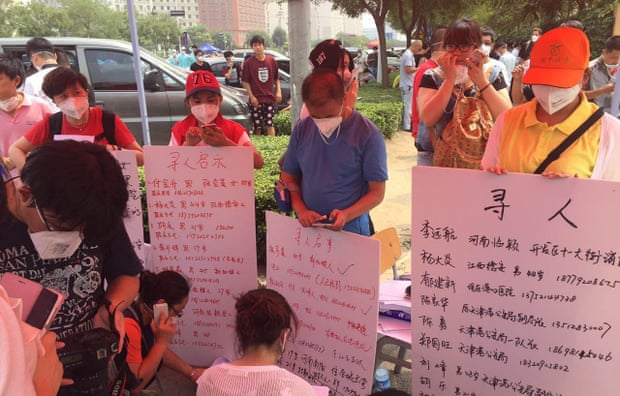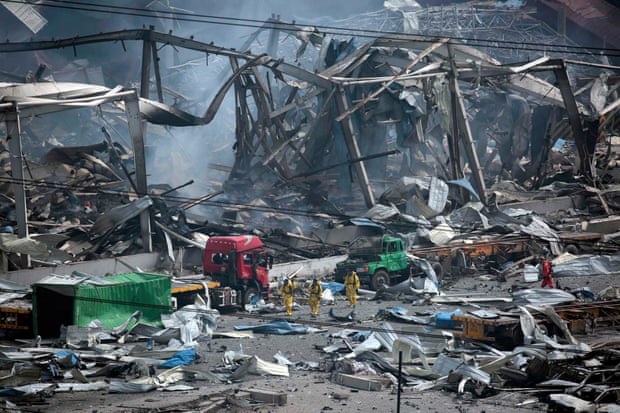Rescuers discovered the 19-year-old survivor – a firefighter named as Zhou Ti – at 7.05am on Friday morning, according to Xinhua, China’s official news agency.
Zhou was taken to Tianjin’s Teda hospital and is in a stable condition, according to The Paper, a Shanghai-based news website.
The discovery offered a rare glimmer of hope as authorities battled to help those left injured or homeless when a warehouse storing hazardous chemicals caught fire and exploded on Wednesday sending a mushroom cloud rising into the night sky.
With acrid black smoke still billowing from the disaster zone, more than 1,020 firefighters continued to battle “raging” fires in the area, Zhou Tian, Tianjin’s fire chief, told Xinhua on Friday.
The official death toll rose to 55 after five more bodies were found, according to state broadcaster CCTV.
As the body count rose, displaced residents took shelter in the homes of relatives or in makeshift government camps set up in local primary schools. At least 6,000 people were expected in such shelters on Thursday night, a local official said.
By Friday morning, around 200 volunteers and family members looking for lost relatives were milling around outside the primary school opposite the GSK Glaxo Smith Kline Tianjin headquarters.
Xie Penchen, a 20-year-old student at Tianjin Business University, said the relocated residents living inside the the school were free to come and go, but the volunteers were not allowed in. Ten army guards stood at the front gate of the compound, alongside a police car.
At the front of the gate, volunteers had erected a tent where they were maintaining long lists and posters featuring the names, descriptions and contact details of some of the missing.
“We have a group on WeChat where volunteers circulate the names of the missing and inform each other if anyone has been found” Xie said.

Asked why the government wasn’t doing this work, Xie said: “They’re focussing on the explosion. That’s more important than this. They don’t have extra energy to deal with this as well.
“Of course this is important too, but while they direct their energy to that, common people like us can offer our help in this way.”
Han Jin, a retired teacher who lives in the Vantone Central Park compound close to the blast site, said she had fled her flat taking nothing but her pink-eared poodle, Little Jingjing.
“When we had to leave, my husband told me to take valuables but all I took was Little Jingjing,” she recalled. “I wouldn’t dream of leaving Jingjing alone here. As long as we’re together it’s fine – even if we die together.”

Han said help – and answers – were not reaching victims fast enough. “On TV all you can see are reports about the army being dispatched to the scene but there’s no news that we really need,” she told the Guardian, standing beneath dozens of crumpled window frames that had been destroyed by the blast.
“What about the questions we really need answers to? When will it be safe to come back? Is the air OK? For people like us who live within 2km of the blast site, how long do we have to wear these masks? What’s happening with the rebuilding and repairs? When can we come back?”
Another woman, who gave her name only as Ms Zhang, offered a more generous appraisal of the official response. “It is national news, so of course the central government will have to do something about it,” Zhang said, as she returned to inspect an apartment in the same compound that was the home of her relatives until Wednesday night.
“At times like these what else can you do but depend on the government’s help? There has been a lot of work done by volunteers but to deal with damage of this scale, the government’s help is needed.”
At the Vantone Central Park – which is around 2km from the scene of the disaster – signs of the blast were everywhere.
The glass façade of the Jingcheng Real Estate company had been completely shattered. From a fourth-floor apartment a man peered down from a pane-less window at a carpet of glass.
A bright red banner hanging at the heart of the compound read: “It is everyone’s duty to report crimes involving guns and explosives.”
“Look at this damage – it’s like an earthquake hit,” said Zhang, who said her relatives had fled with their young child following the explosion. “I’ve come because they’re still too scared to come back,” she said. “Young children can’t really comprehend these kinds of things.”

Others were refusing to leave the area around the blast site, despite government calls to evacuate and fears that volatile chemicals could trigger secondary explosions.
Authorities admitted they had still not been able to determine which chemicals were being stored in the warehouse at the time of the disaster, blaming “major discrepancies” in company and customs records.
Liu Yandon, a top Communist party leader, visited Tianjin on Friday morning and ordered officials there to provide the best possible medical care to the wounded, especially the 71 people reported to be in a critical condition. Liu said psychological support and counselling should be offered to families of the dead and injured as well as rescue workers.
A shopkeeper, who gave his name as Mr Zhang, was still working at his convenience store in the residential compound on Friday morning.
“It was like a huge [gust of] wind from a massive storm,” he said of the disaster that had devastated his community.
The ceiling above the shopkeeper had largely caved in and the ground was littered with crumbling roof tiles but Zhang insisted he would stay. “We’ve been listening to government updates and they say there is no problem,” he said.
But with nearly every apartment having suffered damage, most neighbours had sought shelter in a nearby school, he admitted. “Everyone has moved out of here. They all ran off. They’re afraid to come back.”
Additional reporting by Luna Lin


No comments:
Post a Comment